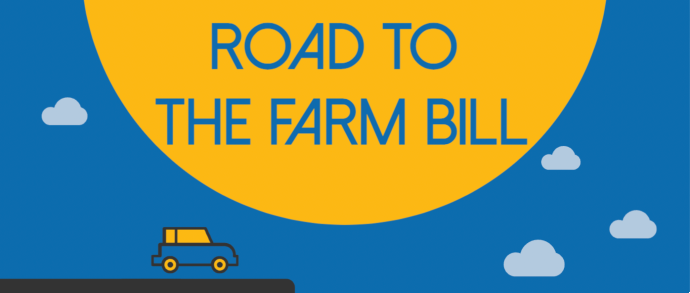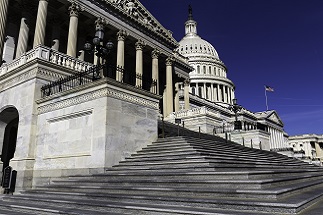Visit Road to the Farm Bill for FRAC’s Farm Bill priority legislation. Check out FRAC’s Bills We’re Supporting page for additional priorities for families struggling against hunger.

Leave Behind: Fiscal Year 2025 Budget and Appropriations Priorities for Food and Nutrition Programs
The federal nutrition programs are a critical support for tens of millions of households — including individuals of all ages — by helping them put food on the table during times of need. Investing in hunger prevention and relief makes good fiscal sense. Hunger increases health care costs, lowers worker productivity, harms children’s development, and diminishes students’ educational attainment. These negative impacts can be minimized with robust funding and support for the federal nutrition programs.
Use this Fiscal Year 2025 Budget and Appropriations leave behind in your advocacy.

Join National, State, and Community-based Organizations in a Letter Urging Congress to Protect and Strengthen SNAP in Farm Bill Negotiations
Recently, the House Agriculture Committee voted out the Farm, Food, and National Security Act of 2024 (House Farm Bill). The bill poses a serious threat to the health and wellbeing of the more than 41.4 million people who rely on Supplemental Nutrition Assistance Program (SNAP) to put food on the table. Advocates demand that any Farm Bill must ensure that SNAP is protected and strengthened and that benefit adequacy, equitable access, and program administration remain core tenets of the program.
Action Needed: We urge you to join national, state, and community-based organizations in sending a joint letter to Congress urging that any Farm Bill must – at its core – ensure that SNAP is protected and strengthened. Additionally, we will oppose any Farm Bill which proposes cuts to SNAP including restricting future Thrifty Food Plan benefit adjustments – nearly $30 billion in cuts over 10 years, according to the Congressional Budget Office – in addition to provisions outsourcing administrative functions currently required to be performed by public sector merit employees.
- Read the sign-on letter.
- Fill out the form to sign on your organization. Organizations only, please!
Deadline: Mid-June or when 1,000 groups have signed on, whichever comes first.

Action Needed: Oppose House Agriculture Committee Farm Bill
That Would Cut SNAP’s Future Thrifty Food Plan Benefits
The House Agriculture Committee voted out of Committee the Farm, Food, and National Security Act of 2024 (House Farm Bill), by a vote of 33-21, on early Friday morning, 5/24. All Republicans and four Democrats – Sorensen (D-IL), Caraveo (D-CO), Davis (D-NC), and Bishop (D-GA) – voted to advance the bill. The bill poses a serious threat to the health and wellbeing of the more than 41.4 million people who rely on SNAP to put food on the table. See Ranking Member David Scott’s (D-GA) opening statement and FRAC’s statement in opposition.
Take Action Now in Advance of Thursday’s Markup!
- Reach out immediately to your Members on the House Agriculture Committee — and urge them to speak out and oppose the cuts to SNAP in Chairman Thompson’s Farm Bill. See the House Directory for phone numbers.
- Email your Members an updated letter through FRAC’s Action Network. Send them this resource on why the Thrifty Food Plan must be protected.
- Use social media to tag your Members and urge them to vote no!
House Agriculture Committee Farm Bill Resources
- House Ag Committee — Farm, Food, and National Security Act of 2024: Discussion Draft
- Updated Title-by-Title Summary
- House Ag Committee Ranking Member David Scott’s (D-GA) reaction to Farm Bill release
- FRAC’s statement opposing Chairman Thompson’s Farm Bill
- House Ag Committee Dems — What They Are Saying: Groups Oppose Partisan Farm Bill
For questions or more information, contact Tim Klipp-Lockhart, tklipp-lockhart@frac.org; or Ellen Teller, eteller@frac.org.

Child Tax Credit Advocacy Needed: Join April 2 Day of Action to Push for Senate Vote
Join the Food Research & Action Center (FRAC), the Coalition on Human Needs, Economic Security Project, MomsRising, and our varied partners for an April 2 day of action focused on getting the Child Tax Credit (CTC) improvements in the Tax Relief for American Families and Workers Act over the finish line in the Senate.
Take Action
Build momentum in the lead-up to April 2, the day of, and beyond:
- Use and share with your networks the FRAC Action Network to call on the Senate to pass the bill.
- Meet with Senate offices to push on the urgency and importance of CTC improvements to improve food security and lift families with children out of poverty.
- Get vocal on social media.
State of Play
Urge your Senators to swifty take up and pass the Tax Relief for American Families and Workers Act when they return to Washington, D.C., and to reject any amendments that could weaken or limit the impact of the CTC for families. The House overwhelmingly passed the bill (357–70) in January.
An expanded and inclusive CTC is a transformational policy for addressing hunger among families with children. Under the House-passed bill, approximately 16 million out of the 19 million children currently left out of the full or any CTC will benefit, and an estimated 400,000 children will be lifted above the poverty line.
Resources
Resources to draw on and share:
- National anti-hunger organization letter in support of CTC improvements;
- FRAC Action Network’s pre-populated message to send directly to your Senators;
- Economic Security Project and Coalition on Human Needs toolkits;
- Center on Budget and Policy Priorities’ resources on young children and the impact on low-income households in your state; and a
- FRAC research brief on expanded CTC and hunger.
For more information on the CTC, contact Susan Beaudoin, sbeaudoin@frac.org; for help with communications with your Senate offices, contact Tim Klipp-Lockhart, tklipp-lockhart@frac.org, or Ellen Teller, eteller@frac.org.

Food Research & Action Center Applauds Congress for Releasing FY 2024 Spending Bill to Fully Fund WIC, Rejecting Harmful SNAP Policy Rider
“At a crucial juncture, Congress on March 3, 2024 released a final fiscal year (FY) 2024 Agriculture Appropriations package, securing $7.030 billion in critical funding for the Special Supplemental Nutrition Program for Women, Infants, and Children (WIC), a lifeline for nearly 7 million pregnant and postpartum women and young children, including approximately half of all infants born in the U.S. By rejecting a substantial number of harmful policy riders, which included efforts to restrict SNAP benefits — a proposal which received widespread, bipartisan criticism, Congress has also shown a commitment to the health, well-being, and dignity of millions of families.” Read more in FRAC’s statement,

House Passes Tax Proposal Including Child Tax Credit Enhancements in Bipartisan Vote
“FRAC applauds the House for swiftly and overwhelmingly passing the Tax Relief for American Families and Workers Act, a vital step in expanding the Child Tax Credit and addressing our nation’s child hunger crisis. The bill’s enhancements to the tax credit will benefit 16 million children currently left out of receiving the full or any credit, and will lift 400,000 above the poverty line. Investing in families is crucial to ending hunger and fostering a more prosperous society. We now urge the Senate to expedite this legislation without amendments – hungry families can’t wait.”
– FRAC President Luis Guardia

Action Needed: Urge Your Members of Congress to Cosponsor SNAP Priority Legislation in Upcoming Farm Bill
Join advocates from across the country in urging Members of Congress to support the Supplemental Nutrition Assistance Program (SNAP) by cosponsoring anti-hunger priority legislation to be considered in the upcoming Farm Bill.
Action needed: Urge Congress to protect and strengthen SNAP in the upcoming Farm Bill by supporting and cosponsoring the following legislation:
- The Improving Access to Nutrition Act (H.R. 1510/S. 2435) would end harsh and arbitrary time limits on SNAP benefits for certain individuals and allow them to access the food, nutrition, and overall health benefits provided by the program. Bill highlights, House and Senate sponsors.
- The Closing the Meal Gap Act (H.R. 3037/S. 1336) would base SNAP benefit allotments on the more adequate Low-Cost Food Plan, boost SNAP benefits for families with children forced to choose between food and shelter, increase benefits for older adults forced to choose between food and medicine, raise the SNAP minimum monthly benefit, and improve equitable access by extending SNAP to Puerto Rico (replacing the current block-granted Nutrition Assistance Program). Bill highlights, House and Senate cosponsors.
- The Enhance Access to SNAP Act (EATS) (H.R. 3183/S. 1488) would eliminate the barriers that college students face when accessing SNAP. Bill highlights, House and Senate cosponsors.
- The Hot Foods Act (H.R. 3519/S. 2258) would end the prohibition on use of SNAP benefits to purchase hot prepared foods from food retailers. Bill highlights, House and Senate cosponsors.
- The Lift the Bar Act (H.R. 4170/S. 2038) would eliminate the five-year bar (waiting period) for legal permanent immigrants to access SNAP and other federal programs. Bill highlights, House and Senate cosponsors.
- The Restore Act (H.R. 3479/S. 1753) would repeal the lifetime federal ban on individuals with felony drug convictions from receiving SNAP. Bill highlights, House and Senate cosponsors.
For more information on engaging your Members of Congress, contact Vijay Das, vdas@frac.org, or Tim Klipp-Lockhart, tklipp-lockhart@frac.org. For information on SNAP, contact Gina Plata-Nino, gplata-nino@frac.org.

FRAC’s Road to the Farm Bill Resource Center
Visit FRAC’s Road to the Farm Bill page to discover priority SNAP legislation, Farm Bill talking points, critical actions, and much more.

Budget Reconciliation 101
Curious about Budget Reconciliation? Unsure about the process or special rules to look out for? Explore this three-page report that explains what you need to know.

Sign Up for the FRAC Action Network!
Urge your Representatives to support and strengthen the Federal Nutrition Programs. Learn about the latest opportunities for action by signing up for the FRAC Action Network. Hungry people can’t wait.
Take Action

Organize a Site Visit
Read More
Recent Publications & Data
See More Resources- Report
Efforts by health care providers to address food insecurity continue to grow. FRAC’s new research brief underscores the importance of connecting patients to SNAP, WIC, and other federal nutrition programs as the foundational intervention to address food insecurity in health care settings;
Read the research brief
provides key steps that health care providers can take to connect patients to federal nutrition programs; and synthesizes research on food insecurity interventions in health care settings that featured connecting patients to SNAP and WIC. Learn more in Connecting Patients to SNAP and WIC in Health Care Settings. - Advocacy Tool
The federal nutrition programs are a critical support for tens of millions of households — including individuals of all ages — by helping them put food on the table during times of need. Investing in hunger prevention and relief makes good fiscal sense. Hunger increases health care costs, lowers worker productivity, harms children’s development, and diminishes students’ educational attainment. These negative impacts can be minimized with robust funding and support for the federal nutrition programs. Use this Fiscal Year 2025 Budget and Appropriations leave behind in your advocacy.
Read the leave behind - Advocacy Tool
School meals play an important role in reducing childhood hunger, supporting good nutrition, and ensuring that students are hunger-free and ready to get the most out of their school day. Use this 2024 Healthy School Meals for All leave behind in your advocacy.
Read the leave behind - Advocacy Tool
An expanded and inclusive CTC is a transformational policy for addressing hunger among families with children.3 With the tax credit improvements in the Tax Relief for American Families and Workers Act, Congress has a unique opportunity to address hunger among households with children and improve the nutrition, health, and well-being of millions in our nation. Use this 2024 Leave Behind in your advocacy.
Read the leave behind
News
FRAC Chat
The first Older Americans Month in May 1963 celebrated the contributions of older adults as well as the unique challenges that they face. Special attention to older Americans inspired policy changes like Medicare, which facilitated older adults’ independence, health, and dignity.1
This month, we celebrate the strides made to support older Americans and acknowledge that older adults still face many barriers to active aging and wellness, including food insecurity.
The Supplemental Nutrition Assistance Program (SNAP) is a vital tool for public health, helping families supplement their budgets to put food on the table. A new Food Research & Action Center (FRAC) research brief underscores the ways that consumer choice in SNAP enhances dignity and equity in the program and entrusts families to make decisions about their health.

This month, the U.S. Department of Agriculture (USDA) published a final rule revising the WIC food package. The rule includes important updates that will enhance equitable access to nutritious food, improve the nutritional quality of the foods offered, and make WIC more participant-centered. These changes will contribute to longstanding positive impacts on program participation, health outcomes for WIC participants, and efforts to address health disparities.

